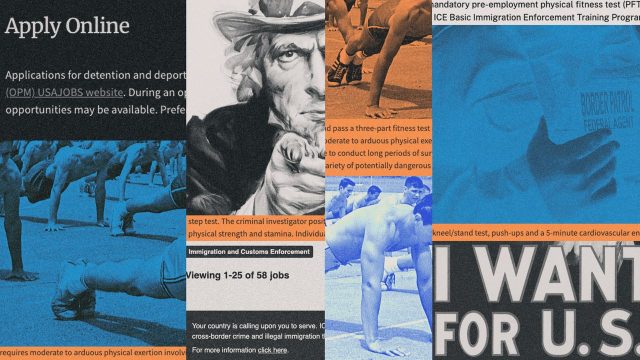
President Donald Trump’s effort to supercharge his anti-immigration efforts has run into a speed bump of the administration’s own making. By pushing to dramatically expand the ranks of the Department of Homeland Security’s various tactical agencies, including Immigration and Customs Enforcement and Customs and Border Protection, the White House has softened its recruitment process and standards in the hopes of meeting its own self-imposed staffing goals. So far, the results have seemed decidedly mixed. As DHS continues to dispatch federal rendition squads into migrant communities across the country, the shifting standards and expanded recruitment push are affecting Trump’s deportation agenda.
New recruits are ‘dropping like flies’
Within ICE, the agency’s personal-fitness test has become a “foe more powerful than any activist group,” said The Atlantic, with “more than a third” of recruits failing to meet entry requirements of 15 push-ups, 32 sit-ups, and a 1.5-mile run in 14 minutes. Standards at the ICE training facility in Georgia have already been “eased to boost recruitment” with many agency veterans worrying over the “quality of the new recruits being fast-tracked onto the street” to meet White House demands.
ICE has been “going all out to expand” its ranks as quickly as possible to meet the administration’s goal of 3,000 immigration arrests daily, said The Independent. In addition to increased funding, that expansion has included “eliminating requirements around Spanish-language proficiency” as well as undoing an agency age cap that had limited the applicant pool to 21-40. It has also turned to “substantial signing bonuses” as part of its “streamlining” of the hiring process, said Salon. But “critics, immigration policy experts and former officials” said had already faced risks from “weakening background checks and other vetting standards.”
Placing some recruits into ICE’s official training program before they have even completed the agency’s vetting process is an “unusual sequence of events,” said NBC News. It has contributed to the revelations that some trainees have “failed drug testing,” have “disqualifying criminal backgrounds” or simply “don’t meet the physical or academic requirements to serve.” The agency’s standards were “more strictly adhered to before a hiring surge that began this summer.” The stricter structure was meant to “weed out disqualified candidates before they would be sent to training.”
Recruits are “dropping like flies, and rightly so,” said former ICE Baltimore Field Office Director Darius Reeves to NBC. “It makes sense. We’re going to drop the age requirements, of course this was going to happen.”
Does this improve ‘efficiency and accountability’?
For aspiring ICE agents, the “fitness test has been the biggest nemesis to the new recruits,” said The Atlantic, taking down “more trainees than any other requirement,” according to agency officials. In intra-agency messages, officials have lamented the “amount of athletically allergic candidates” who “misrepresented” themselves during the recruitment process. Some academy trainers have even “moved up the fitness test on the academy’s calendar” to sift out “unfit candidates earlier in their training.”
But rescheduling physical exams isn’t about cutting corners, Homeland Security spokesperson Tricia McLaughlin said to The Atlantic. Rather, it’s intended to “improve efficiency and accountability — not to lower standards.” The “vast majority” of new officers hired in this latest recruitment push are “experienced law enforcement officers” who have “already successfully completed a law enforcement academy,” McLaughlin said to CNN.
“Loosening” the hiring and training rules used by DHS is “unacceptable,” said Sen. Dick Durbin (D-Ill.), the ranking member of the Senate Judiciary Committee, in a letter to Secretary Kristi Noem this week. The changes could “result in increased officer misconduct” that would be “similar to or worse” than previous smaller-scale hiring surges.
Past hiring surges, like the one undertaken by CBP in the late 2000s, mean that “we already know how this is going to go,” said Sarah Pierce, director of social policy at the centrist Third Way think tank, to CNN. The United States has already seen “what happens when you hire a law enforcement agent with this speed and with this attitude.”
Lowered training standards and ‘athletically allergic’ hopefuls are getting in the way of the White House plan to turn the Department of Homeland Security into a federal police force






